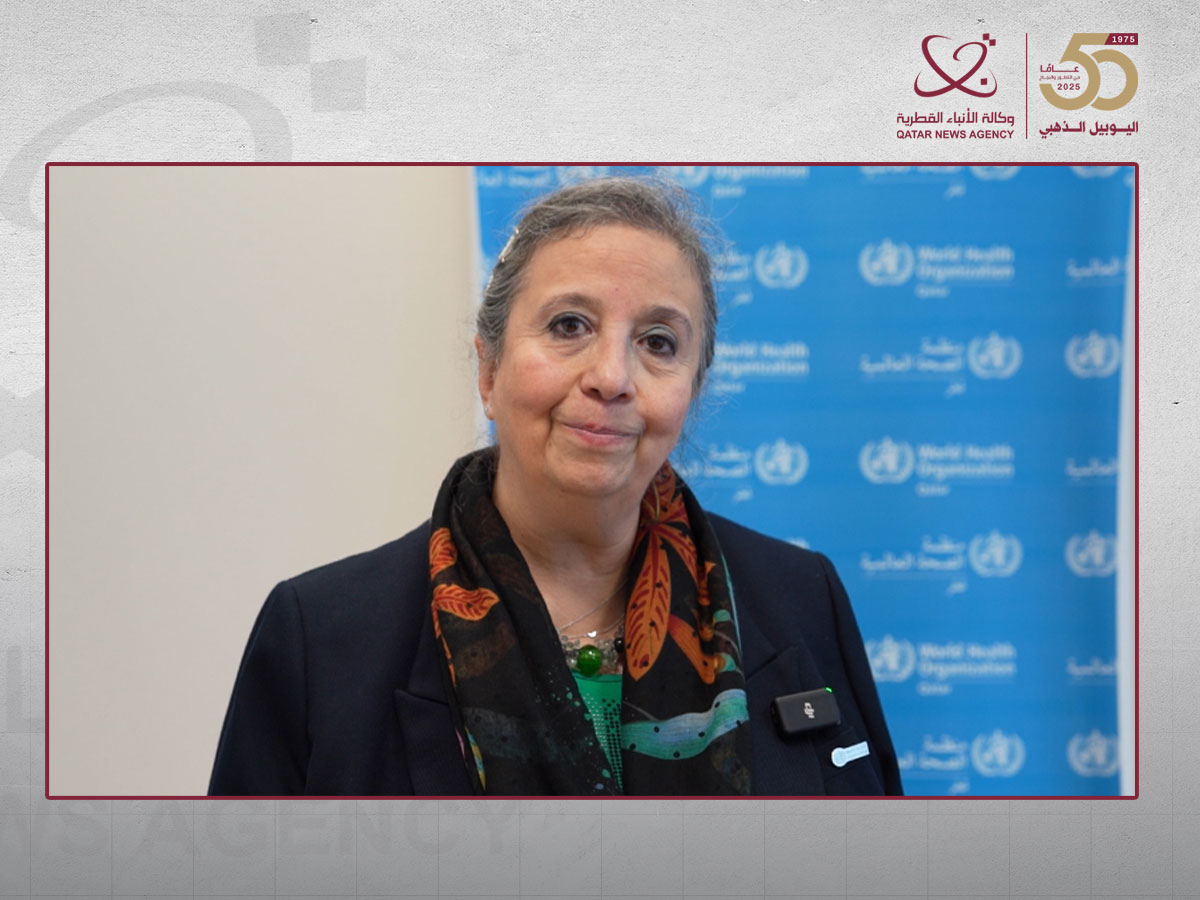Copyright qna

Doha, November 11 (QNA) - There has been an increase in the rates of chronic and non-communicable diseases due to unhealthy lifestyles such as physical inactivity, smoking, obesity, and stress, which led to significant and widespread concerns with serious human and financial consequences for countries and their healthcare systems. According to the World Health Organization (WHO), diabetes is becoming the most common chronic and non-communicable disease. The international community celebrates World Diabetes Day on Nov. 14 each year, since it was adopted by the United Nations General Assembly in 2007. HE WHO Representative in Qatar Dr Rayana Bou Haka, said in an exclusive interview with Qatar News Agency (QNA), that around 800 million people are currently diagnosed with diabetes across the globe. She pointed out that the Eastern Mediterranean Region, which includes 22 countries among them the Gulf Cooperation Council (GCC) states, has the highest regional prevalence rate of diabetes, standing at 17.6 percent among adults aged between 20 and 79 years. She noted that in this same region, there are nearly 85 million adults, one in every six people, living with diabetes. This number is expected to rise by 92 percent to reach 163 million by 2050, posing an increasing burden in both the short and long term, despite the efforts made in health education, awareness, and the development of medicines and treatment methods. Dr. Bou Haka expressed concern that the region also records the highest rate of diabetes-related deaths, 21.6 percent, among working-age individuals (under 60 years old), specifically between 25 and 60 years. At the same time, about one-third of diabetes cases remain undiagnosed, highlighting major gaps in early detection and patient care, which in turn limits people’s ability to live longer, healthier lives. She revealed the extent of diabetes prevalence in the Eastern Mediterranean Region and, in this context, identified the rates for the main complications of the disease: retinopathy (25 percent), kidney disease (23 percent), neuropathy (6 percent), dyslipidemia (56 percent), hypertension (59 percent), ischemic heart disease (25 percent), coronary artery disease (15 percent), and diabetes-related foot complications (6 percent). She pointed out that the proportion of people with diabetes in the Gulf countries ranges between 10 percent and 15 percent of the diagnosed population, noting that in some parts of the world, this figure can reach up to 20 percent. She explained that this variation is due to several factors, including personal and psychological readiness to cope with the disease, lifestyle choices, and unhealthy dietary habits, among others. The WHO Representative in Qatar warned that if the situation continues globally as it is, it will be difficult to achieve the third Sustainable Development Goal (SDG) by 2030, which aims to reduce chronic diseases by one-third (or 33 percent) in each country. She further noted that if current trends persist, only about 11 percent of that target will be achieved by the stated year, a rate she described as below expectations, emphasizing the need for greater attention to prevention, awareness, early diagnosis, and access to related healthcare services and programs. Dr. Bou Haka noted that the countries of the Eastern Mediterranean Region have made some tangible progress, despite the fact that several of them are experiencing crises and wars. However, she pointed out that even in other countries not affected by such conditions, the rate of implementation of programs and guidelines related to diabetes prevention and complication management does not exceed 50 percent. She attributed this mainly to insufficient dissemination of essential knowledge about the disease among patients and their families. The WHO Representative highlighted Qatar’s National Diabetes Strategy and its various pillars, particularly those focusing on awareness, prevention programs, and health education. She emphasized the strategy’s comprehensive approach, which prioritizes prevention, increasing awareness, improving the quality of healthcare, and enhancing research and information systems. In this context, she referred to Qatar's initiative of dedicating a National Sport Day each year and providing exercise equipment in various areas across the country. She praised the efforts of several national bodies, including the Qatar Diabetes Association, and affirmed that Qatar’s healthcare system is advanced, with accessible and integrated services, as well as available diagnostic and treatment options. She also highlighted the continuous encouragement to promote behavioral change, especially among youth. Dr. Bou Haka added that the World Health Organization is working to adopt similar initiatives and to launch a free, open-access online program focused on diabetes education modeled after Qatar's approach. The program aims to raise patients' awareness about early diagnosis, regular follow-up, adherence to medication schedules, and compliance with physicians' instructions. She further explained that for every one dollar spent on diabetes prevention and obesity reduction, countries can save an equivalent of 23 dollars in treatment costs. Similarly, investing one dollar in the prevention of other chronic diseases yields an estimated seven-dollar return in health and economic benefits. Dr. Bou Haka also praised Qatar's support for WHO health programs, noting that this contributes to strengthening targeted services and improving access to treatment. She emphasized the importance of countries facilitating patients' access to medications by engaging in joint drug procurement initiatives to reduce prices and make treatments more affordable. In her interview with Qatar News Agency (QNA), WHO Representative in Qatar Dr. Rayana Ahmed Bou Haka pointed out a balance in the rates of diabetes among both men and women, indicating that some studies suggest that complications of the disease are more prevalent in men due to several reasons, especially in terms of type 2 diabetes, when the body cannot use insulin properly or does not produce enough of it, leading to an accumulation of sugar (glucose) in the blood. She emphasized the importance of undergoing medical examinations, especially for those over 35 years of age, even if they do not show symptoms of diabetes or other diseases, given that there are silent diseases with serious complications. The world aspires for 80 percent of people with diabetes and 80 percent of those with hypertension to be diagnosed and aware of their condition by 2030, and for their blood sugar and blood pressure levels to be under control. The goal is also for 60 percent of those over 40 years of age to adhere regularly to their medication, and for 100 percent of people with insulin-dependent type 1 diabetes to have access to insulin, monitoring, and effective disease management, she said. Dr. Bou Haka also stressed that this is a shared responsibility, requiring concerted efforts of governments, institutions and communities, as well as individuals. World Diabetes Day - an annual event that falls on Nov. 14, aims to raise awareness about diabetes, encourage early diagnosis, promote the importance of detecting the disease in its early stages, and provide support to patients and their families, as well as highlight the impact of diabetes on society and the importance of preventing and managing it. (QNA)



